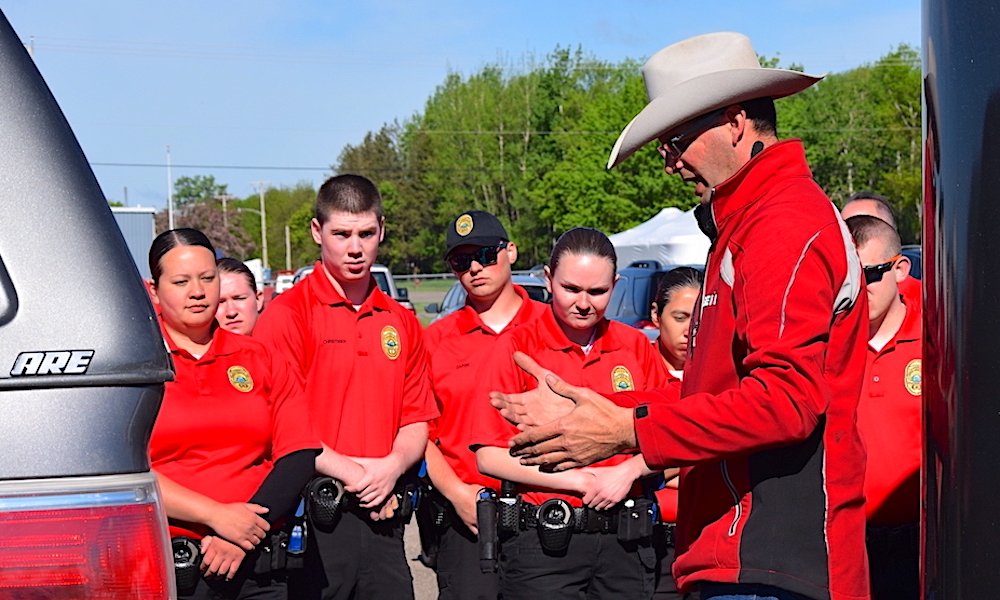Conservation Officer Preparation A.A.S. Degree
Career Description
Students in the Conservation Officer Preparation, AAS Program learn skills that lead to a conservation officer profession. To become a conservation officer, the Skills Certificate is required in addition to this program. Conservation officers work with fish and wildlife agencies, state parks, trails, forests, waters and wetlands, as well as work in educational activities within and throughout Minnesota. Conservation officers often work from 4×4 patrol vehicles, snowmobiles, ATV, and various watercrafts. The selection process for being a conservation officer in Minnesota includes a written exam, division interview, background investigation, functional capacity exam, psychological assessment and a medical evaluation. In addition, conservation officers must be a United States Citizen, possess a valid Minnesota driver’s license, have no felony convictions, have the ability to swim and possess a license or be eligible for licensing as a Minnesota peace officer at the time of hire.
Program Information
Get a hands-on learning experience outside of the classroom walls with weekly fieldwork in the woods. This two-year program has prepared many successful conservation officers who work throughout the Midwest and inside the federal government. A fleet of new state-of-the-art squad cars gives students a driver’s seat view into becoming a MN peace officer. Because of a close partnership between area peace officers and the college, students have a wide selection of choices for internships. When combining a Conservation Officer Preparation, A.A.S Degree and the Skills Certificate, you can serve as a conservation officer or hold nearly any other peace officer licensed position.
Program Outcomes
Graduates will be able to:
- Demonstrate field identification of regionally important mammals, birds and fish and their communities;
- Use a broad range of technological tools to research, document, map, measure, record and analyze data relevant to natural resources;
- Navigate and safely function in an outdoor workplace;
- Demonstrate knowledge of structure, process and relationships between peace officers, the courts and correctional systems;
- Process crime scenes from preliminary stage through disposition;
- Recognize diversity and cultural differences as a mature, ethical, compassionate, and adaptable citizen while meeting the needs of clients and communities;
- Demonstrate an understanding of the roles of the legislative, judicial and executive branches and how they relate to criminal law;
- Demonstrate strong communication skills–both oral and written. Understand leadership challenges and contributions in diverse communities that have experienced racial oppression as it intersects with gender, class, sexuality, disability, and other social identities; and
- Prepare as public servants with the fundamental duty to serve and protect the community from harm and respect the constitutional rights of all citizens.
Special Program Requirements
In addition to the program requirements, students must meet the following conditions in order to graduate:
- College Cumulative GPA Requirement: cumulative grade point average (GPA) of credits attempted and completed at CLC must be at least 2.0;
- College Technical Core GPA Requirement: cumulative GPA of credits attempted and completed towards the technical core of the diploma or degree must be at least 2.0;
- Residency Requirement: students must complete 25% of their credits at Central Lakes College;
- Courses required for Minnesota P.O.S.T. licensing must be completed within three (3) years of starting the certificate;
- Students must have a valid Emergency Medical Responder certification (or higher) at the time of the Post Board Exam.
Admissions
- Students must complete and pass a background check prior to being officially admitted into the program. This background check must be completed prior to the first day of classes.
- Students must also complete the Minnesota Multiphasic Personality Inventory (MMPI) with a psychologist approved by the Program Coordinator prior to admission into the program.
- Student must be able to complete the skills portion of the program to become licensed. This involves several real-life crime scene situations, firearms and physical proficiency, and law enforcement procedural practices.
Please see the Criminal Justice Coordinator for further information.
Employment Statistics
For more information regarding employment statistics, career salary information and estimated job growth, follow the resource links below:
https://apps.deed.state.mn.us/lmi/ces/
http://www.bls.gov/ooh/home.htm
http://www.iseek.org/jobs/jobmarket.html

Program Requirements
Required Discipline Courses (51 credits)
CRJU 1101 Criminal Justice, 3 cr
CRJU 1104 Juvenile Justice, 3 cr
CRJU 1112 Police and the Community, 3 cr
CRJU 2101* Criminal Law**, 3 cr
CRJU 2102* Criminal Procedures, 4 cr
CRJU 2106 Fitness for Minnesota Peace Officers**, 2 cr
CRJU 2108 Criminal Investigations, 3 cr
CRJU 2114 Traffic Law**, 3 cr
CRJU 2124 General Evidence Identification Prep, 4 cr
CRJU 2126 Racial and Ethnic Awareness for Minnesota Peace Officers, 4 cr
CRJU 2140 Behavioral Science for Peace Officers, 3 cr
NATR 1106 Intro to Conservation Officer Careers, 2 cr
NATR 1125 Ichthyology, 3 cr
NATR 1130 Mammalogy, 3 cr
NATR 1135 Ornithology, 3 cr
NATR 1360 Animal Behavior, 3 cr
NATR 2110 Herpetology, 2 cr
Required MnTC Courses (17 credits)
BIOL 2415 General Ecology (Goals 3,10), 4 cr
COMM 2420 Intercultural Communication (Goals 1,7) OR
COMM 2422* Honors Intercultural Communication (Goals 1,7), 3 cr
ENGL 1410* Composition I (Goal 1) OR
ENGL 1420* Honors Composition I (Goal 1), 4 cr
PSYC 2441 Social Psychology (Goals 5,7), 3 cr
SOCL 2405 Criminology (Goal 5) OR
SOCL 2481 Race, Ethnicity, Oppression (Goals 5,7), 3 cr
An A.A.S. degree requires a minimum of 15 credits selected from at least three of the ten goal areas of the Minnesota Transfer Curriculum (MnTC).
*Denotes Prerequisites
** These courses must be completed prior to SKILLS.
GRADUATION REQUIREMENT – 68 CREDITS
Program Instructors
| Photo | First Name | Last Name | Position | Department | Phone | Alt. Phone: | URL | wdt_ID | Details | |
|---|---|---|---|---|---|---|---|---|---|---|
 |
Aubrey | Beadell | Advisor | TRIOStudentSupportServices | (218) 855-8014 | aubrey.beadell@clcmn.edu | 1 | More details | ||
 |
Nick | O'Reilly | Occupational Skills Program College Lab Assistant | OccupationalSkills | 218-855-8077 | Nicholas.oreilly@clcmn.edu | 2 | More details | ||
 |
Kevin | Lomax | College Lab Assistant | Automotive Faculty | 218-855-8000 | KLomax@clcmn.edu | 3 | More details | ||
 |
Jody | Flynn | Accessibility Services Assistant | Accessibility | 218-855-8056 | jody.flynn@clcmn.edu | 5 | More details | ||
 |
Deana | Bobzien | Instructor | CollegeCareerStudies - Mathematics - Supportive Services | 218-855-8339 | deana.bobzien@clcmn.edu | 7 | More details | ||
 |
Brianna | Rajkowski | Advisor | TRIOStudentSupportServices | 218-855-8228 | brianna.rajkowski@clcmn.edu | 8 | More details | ||
 |
Cynthia | Dionysius | AD Nursing Faculty | NursingASDegree | 218-855-8133 | cindy.dionysius@clcmn.edu | 9 | More details | ||
 |
Tajia | Anderson | PSEO Specialist | Admissions - CollegeCreditInHighSchool- PSEO | (218) 855-8079 | tajia.anderson@clcmn.edu | 10 | More details | ||
 |
David | Gray | Instructor | History | 218-855-8276 | david.gray@clcmn.edu | 14 | More details | ||
 |
Jim | Nagy | Adjunct Instructor | GraphicDesign | 218-855-8157 | james.nagy@clcmn.edu | 15 | More details | ||
 |
Brandon | Schneider | Instructor | HeavyEquipment | 218-894-5179 | brandon.schneider@clcmn.edu | 16 | More details | ||
 |
Natalia | DePauw | Director of Dual Enrollment | Advising - PSEO - CollegeCreditInHighSchool | 218-855-8263 | natalia.depauw@clcmn.edu | 18 | More details | ||
| Amy | Disterhaupt | Admissions Specialist | Admissions | 218-855-8250 | amy.disterhaupt@clcmn.edu | 20 | More details | |||
 |
Nick | Heisserer | Dean of Brainerd Career & Technical Programs | Administration | 218-855-8067 | nick.heisserer@clcmn.edu | 21 | More details | ||
 |
Matthew | Krueger | Environmental Health and Safety Officer | Maintenance - Security - Safety | 218-855-8115 | matthew.krueger@clcmn.edu | 22 | More details | ||
 |
Mark | Lindquist | Instructor | Music | 218-855-8203 | mark.lindquist@clcmn.edu | 23 | More details | ||
 |
Jeremy | Goddard | Bookstore/Print Shop | Bookstore Supportive Services | 218-855-8146 | Jeremy.Goddard@clcmn.edu | 25 | More details | ||
 |
Sarah | Jennissen | Instsructor | NursingAssistant - PracticalNursing - TrainedMedicationAid | 218-894-5308 | sarah.jennissen@clcmn.edu | 26 | More details | ||
 |
Cash | Robinson | Academic Advisor | TRIOUpwardBound - Advising | 218-855-8035 | cash.robinson@clcmn.edu | 28 | More details | ||
 |
Ryan | Wright | Enrollment Representative | Admissions - CampusTours | 218-855-8013 | ryan.wright@clcmn.edu | 31 | More details | ||
 |
Steve | Wenzel | Instructor | PoliticalScience | 218-855-8073 | stephen.wenzel@clcmn.edu | 32 | More details | ||
 |
Julie | Woitalla | Instructor | NursingASDegree - PracticalNursing | 218-855-8168 | julie.woitalla@clcmn.edu | 33 | More details | ||
 |
Josh | Zaborowski | Upward Bound Advisor | TRIOUpwardBound - Assessment | 218-855-8032 | joshua.zaborowski@clcmn.edu | 35 | More details | ||
 |
Paul | Zimmerman | Instructor | Diesel Faculty | 218-894-5143 | paul.zimmerman@clcmn.edu | 36 | More details | ||
 |
Ed | Uhlenkamp | Instructor | FarmBusinessManagement | 218-894-5160 | edward.uhlenkamp@clcmn.edu | https://dynamicforms.ngwebsolutions.com/ShowForm.aspx?RequestedDynamicFormTemplate=32c40b45-028c-46d6-9f79-9c1edc503713 | 38 | More details |
Photo:
First Name:
Last Name:
Position:
Phone:
Email:
